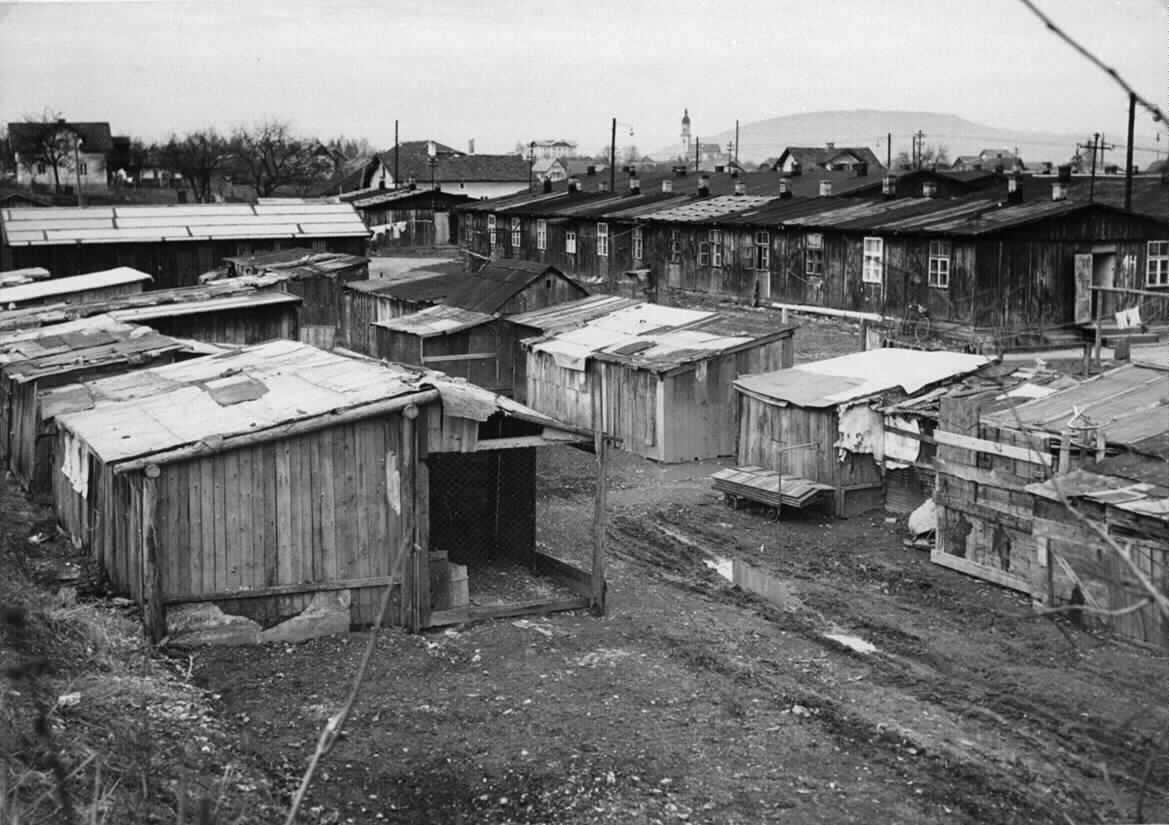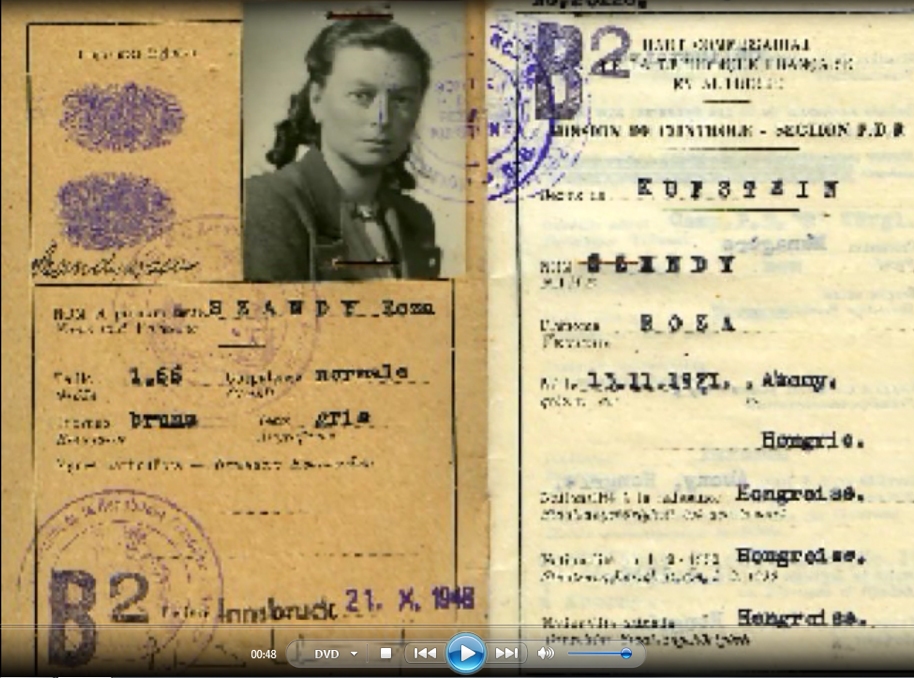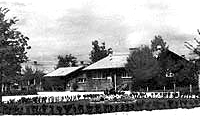Download to your desktop the 2011 Excel spreadsheet (in German) of camps and camp info: AustriaCampsV7.xls provided by Klaus.
Austrian archives - https://www.oesta.gv.at
Innsbruck, Land Tyrol, Capitol of Tyrol, French Zone; Land Steiermark British zone, Ukrainians, Jews, Team 322, See also Tirol. Innsbruck District included these camps:
Innsbruck,
Etudiants,
Höttingerau, Hötting,
Passage,
Siglanger
Innsbrucker Bundesstrasse [federal road]; US zone;
Some Ukrainian documentation at Shevchenko Scientific Society Library: http://www.shevchenko.org/
City archives: Stadtarchiv
Innsbruck,
Badgasse 2,
6020 Innsbruck
Diözese Innsbruck
A-6021 Innsbruck, Riedgasse 9
Tel. (0512) [0043 512] 288079 20
+8476910140
July 2, 2012, Hi Olga,
I have been trying to research
my mother's travels and see if I could find some records. She was first
in Kufstein around 1945 before she was eventually camped outside Innsbruck
(Solbad Hall - now called Hall in Tirol) from 1945 - 1948. I have
tried to find records at tw Stadtamt in both Hall in Tirol and Kufstein
an both say they don't really have anything they know of. Do you have any
idea on where I go to do more research? Here is a photo of her "papers" we
found after she passed away. Many thanks, John A. Bosarge
[email protected]
4/5/11 wrote: French:
Bonjour Madame
J'ai découvert à la mort de papa, des lettres d'un monsieur
GRESNOW Alex
il vivait avec sa famille au camp numéro 7 à Salzburg
(juin 1949)
je pense que le petit enfant sur la photo de Saalfeden est son fils :j'ai
une photo ou la ressemblance est frappante. Mon papa Ivan Kononow était
Ukrainien il a était fait prisonnier à Dnipropetrovk en mai
1942 il avait 16 ans A la libération des camps ( il ne nous a jamais
dit ou il était détenu ) il s'est engagé dans la légion étrangère à Innsbruck
sous le nom de komonoff Valentin d'origine Polonaise J'ai des documents
que j'aimerai partager , j'aimerai beaucoup retrouver des gens qui l'on
connu ,ainsi que alex GRESNOW et Alex KAGASECHEK qui l'a suivit à la
légion je
vous remercie pour tout ce travail que vous faites ;vous donnez envie de
retrouver ses origines
Computer Translation
to English:
Hello Madam: Just discovered with death of dad, letters of a Mr GRESNOW
Alex. He lived with his family with the camp number 7 in Salzburg (June
1949). I think that the small child on the photograph of Saalfeden
is his son: I have a photograph and the resemblance is striking. My
dad Ivan Kononow was Ukrainian. He was made prisoner
with Dnipropetrovk in May 1942 when he was 16 years old. With the release
of the camps (it us forever known as or it was held) he was engaged in
the foreign legion with Innsbruck under the name of Komonoff Valentine
of origin Polonaise/Poland. I have documents that I will like to divide, j'
will like much to find people who l've known, like Alex GRESNOW and
Alex KAGASECHEK who l havefollowed to the legion. I thank you for all
this work which you made; you give desire for finding its origins
Alain HEYRAUD [email protected]
Aug. 6, 2020 Dear Olga,
I am searching for a name-list of UNRRA-Team 322 in Austria. The UNRRA-Team 322 served at Innsbruck and Bad Gastein.
Best regards
Thom G. Lackner, Verbal Turbulence Jerrys [email protected]
Austria
Innsbrucker - Bundesstrasse - US zone;
Itzling- on Ehzg. Eugenstrasse, See Salzburg DP center, S.C.; Jews; US zone; UNRRA Team 326,

Photo submitted by Klaus Fohringer: [email protected]
Jägerkaserne - Villach; British zone;
Jägermayer - Hotel and Gasthof [guest house]; Linz; US zone;
Jesenfeldrain - Villach; British zone;
Judenburg - Team 335; Jewish Transient Camp, Liechtenstein called Murdorf-Liechtenstein,
Land Steiermark, on Muir River. 2000 Jews; British zone ; 1946
Judenburg consisted of a number of camps including:
Bridge - Bez Judenburg
Dietersdorf
Kaserne,
Kobenz
Lagergasse
Liechtenstein
Meyer Baracken
Murdorf
Reiterbauer - Bez Judenburg
Schmelz - Bez Judenburg
Sportgasse
Südtirolerstrasse;
Talacker
The camp was well equipped with carpentry, painting, shoemaking, and metalworking shops. Both UNRRA and the AJDC helped to administer the camp. See USHMM Projekt Life Reborn: http://www.ushmm.org
Archives: Murdorf-Liechtenstein (Judenburg)
Adresse: Stadtgemeinde (Municipality) Judenburg, Hauptplatz,
A 8570 Judenburg
Tel: 0043 3572 83141-0
Fax: 0043 3572 83141-222
Email: [email protected]
Address supplied by Herta.
11/2/04 Hello Olga,
I came across your website as I am doing some research on my parents time
as forced laborers in Judenburg, Austria. My father is dead and my mother's
memory has become fuzzy about dates, but I do know they were probably there
between 1943 and 1945. They were brought there from Poland, my mother's parents
and her two younger siblings were also transported to Judenburg. My mother
lived with a farm family who were kind to her. My father (they were not married
at the time) worked on a larger farm that had many young Polish men as slave
labor. I wonder if there is anyone out there who might have some information
about Judenburg at that time and forced laborers specifically. These people
are dying off and it is important that we attempt to preserve this history.
Thank you Jane
Hikel email: [email protected], Central Connecticut State University.
Diary of Life in the Refugee Camps (1948)
By Anton Zakelj, translated and edited by John Zakelj
http://zakeljdiary.s5.com/1948eng.htm
Judendorf - near Villach
Kading - Kärnten; Maria Saal; British zone;
Kammer, on
Lake Attersee "Camp
526" US zone; castle;
On 2/26/08 Hello.
I'm trying to find information about a DP camp that my
mother tells me she lived in Kammer, Austria on Lake Attersee between 1945
and 1948. She
describes it as "Camp 526". Do you have any information, such
as where exactly it was located, what is there now, who lived there, where
they might have gone? I have some pictures that she saved. She also tells
me she worked for the border patrol at the 1653 Hotel Kammer.+8476910140
Thank you for any information you can provided. Please let me know if
you have any questions for me.
Sincerely, Marielle Stone [email protected]
Kammer-Schörfling - Pettighof camps 505, 510, 526, US zone;
"My parents were in this DP camps for several years. My older sister was born there." George Muenz <[email protected]>
Kärnten - had five camps in these towns: Ebenthal, Eberstein, Federaun, Feistritz an der Draw, Feldkirchen; British zone
UNRRA-Teams /Kärnten; British zone:
Team 329 Wolfsberg, St. Andrä,
St. Gertraud
Team 330 Spittal /Drau
Team 331 Lienz
Team 332 Weidmannsdorf, St. Marein
Team 336 Villach
Archives: Kärntner Landesarchi
St. Ruprechter Strasse Nr. 7
9020 Klagenfurt
Tel.: 0463/56234-14
Fax: 0463/56234-20
Email: [email protected] and http://www.landesarchiv.ktn.gv.at
Greetings from Minnesota. Found your excellent web site tonight quite by mistake. I am delighted.
I was a Displaced Person who immigrated to Minnesota in 1952. I was born in the former German Linguistic Island of Gottschee now part of Slovenia. Following the Flucht (flight for life) in 1945 my mother and I lived in various DP Camps in Steiermark and Kärnten, Austria until we were reunited with my father in 1946.
I would certainly enjoying hearing from you. I am intrigued by your interest in this matter and have the feeling that you, or perhaps members of your family may have walked the walked.
Thank you. Sophia Trix Stalzer-Wyant, email: [email protected], born near Tschermoschnitz (Crmosnjice)
Book: Flüchtlingsnot und Flüchtlingshilfe in Kårnten nach 1945 (Stieber, 1999; ISBN 3-900531-45-5) German version.
Book: Die Briten als Besatzungsmacht in Kårntnen 1945-1955 (Stieber, 2005: ISBN 3-900531-57-9): inkl. Lagerkarte; translation The British Acting as Occupation Power in Carinthia 1945-55 (includes camp map)
Kapellenstrasse 41 - Graz; British zone; 1940 f. Bukowina-Umsiedler Lager III?
Kapfenberg (has its own page) in Northern Styria on
Mürz River, UNRRA team 328; Jews ; On Mürz River; British zone; camps:
Nr. 1 Westward Ho; Wienerstrasse, near Kapfenberg 2; Deuchendorf; KG Pötschach
2 WAC - near Ö-¨Ubernahme, Wohnlanger; Hafendorf(?)
3 Lager Schirmitzbühel, KG Deuchendorf
Nr. 5 VAC - Lager Graschniz; Böhlerwerk 6 and Schoss [castle] Graschitz
N. 6 nahe St. Marein
Nr. 7 YAC - Lager Schimitzbühel, Lager Hafendorf, near Ö-¨Ubernahme, Wohnlanger
U = 2
UNRRA garage
8
Redfeld
Auenwiese 1-10
Winklersiedlung
Essenkosiedlung
Parschlugerstrasse
Archives: Stadtgemeinde (Municipality) Kapfenberg
Koloman-Wallisch-Platz 1
A 8605 Kapfenberg
Tel: 0043 3862 22501-0
Email: [email protected]
(diverse DP camps also "Kapfenberg III - Schirmitzbühel), Address supplied
by Herta.
Kellerberg camp - Weissenstein [near Paternion] See Graz camp or Villach,
(British zone)
Kellerberg A
Kellerberg B
Kellerberg X
10/8/2015 Dear Ms Kaczmar,
I am trying to research how repatriation/resettlement was carried out in Feffernitz (and Kellerberg, where the Hungarians were sent in January 1947) and was hoping to hear from some former residents of the camp. I have read Kitty Gogins' book (and have been in email contact with Kitty). It seems that here, as in other places, DPs were reluctant to return to Hungary, but it was very hard to find new countries to go to, meaning some stayed in the camp for quite some time.
I have attached a photo of the camp which might be of interest to former residents. I have also attached a front page of Faklya, the magazine produced by the Hungarian residents of Feffernitz.
If you can identify persons in photo, please email [email protected]
I was wondering if any Hungarian DPs who stayed in Feffernitz have any memories from the camp, particularly on how they managed to resettle either in Hungary or elsewhere? Did the International Refugee Organisation provide help with resettlement, or were DPs reliant on personal contacts to find a new home?
I am writing an article on repatriation/resettlement after the war from Feffernitz. I have read Kitty Gogins' very interesting book (http://www.amazon.com), but would like to know more stories!
Luke [email protected]
May 9, 2020: Dear Ms. Kaczmar:
I hope to find Hungarian people in Lager Kellerberg, 1947. I am not Hungarina, I am Croatian but we were in lager Kellerberg in 1947. That camp was located under a mountain called Goldeck. As I remember, the Hungarian section in that camp was to the far left of us, then were the Croatians and the Slovenians toward the middle of the barracks. To the far right of us there was another set of barracks between the camps a barbed wire fence, possibly one time stables. Jews and other ethnic groups were there. What I can tell you about that picture. I do remember that young man, sitting in the middle with puffed up hair. I do not know his name but I do remember him because, he was so unusual looking.
The kitchen where food was prepared was closer to the Hungarian groups than Croatian. Also 1946-1947 was the coldest winter. The barracks were poorly insulated, the glass on windows froze. And the Kida of the Hungarian and Russian groups did not get along, neither did the Slovenian groups. Also what I can tell you about that camp... that portion of the Hungarian camp caught fire... the Hungarian kids set fire to the forest and it affected their section of the camp. We spent our Christmas in Kellerberg and stayed till spring of 1949. I was 7 years old in 1947. remember going into that forest with my grandmother hoping to find wood and some food to eat. Also, from there, some Hungarians were sent to lager Spital a/d where I lived from till the end of 1951.
Regards, Margaret Siegrist [email protected]
Kematen in Tirol - Innsbruch, UNRRA team 189 (French zone) V5;
Keplerschule - students' camp, UNRRA team 333, (British zone) See See Graz camp
Kernstockgasse 18 - Feldbach; British zone;
Kernstockpl. 1 - Wien, XVI
Kohle und Erz - Bårnbach - British zone;
Kirchenholz (Camp 60) / Frindorf, Austria
In 2005 the end of the Second World War is being commemorated in many different ways. The Hörschings Greens' contribution will be an event this autumn. Just after the end of the War, survivors of concentration camps were accomodated in "Camp 60" (which no longer exists). Many of them died there; they and others who died (such as Russians [Ukrainians] from the forced-labour camp in Frindorf) were buried in Kirchenholz though today only a very few know exactly where. In 1948 the Austrian "Schwarzes Kreuz" (Black Cross - an organization that looks after the graves of war victims) opened these graves and transferred the dead to the St. Martin cemetry for reburial.
Photos submitted by Klaus Fohringer email: [email protected]
D.P. Camp 60 in Hörsching (Hörsching has it's own page)
After the conclusion of medical care for Jewish survivors of concentration
camps, German-speaking refugees from Eastern Europe arrived in the camp.
Two of the shacks had burnt down in May 1945; roughly 2000 people, mainly
from southern Moravia, Bratislava and Yugoslavia, lived in the remaining
eighteen. Most of them subsequently migrated to West Germany, some as far
afield as the USA or Canada; a few settled in Hörsching permanently,
The graveyard in the woods (the Russian [Ukrainian?] graveyard)
This was on a slight rise in Kirchenholz. It acquired the name "Russian graveyard" because
109 Russian [Ukrainian?] prisoners of war from the forced-labour camp in
Frindorf, who died (mostly of pneumonia or heart failure) between September
1941 and April 1942, were buried here. In 1945 thirty victims of the typhus
epidemic in what had been the DAF camp were also buried here. In December
1948 all those buried here were transferred to the cemetery in St. Martin.
We plan to visit the site of these graves on foot, and to learn more from eyewitnesses about the situation in the camp just after the War. Käthe Recheis has written a book called (in German) "Go Home and Forget Everything" about how the survivors were cared for, and about the oppressive situation in the camp. Her sister Marianne will accompany us on this walk and tell us about her experiences as a nurse in Camp 60.
We are searching for eyewitnesses!
We cordially invite all eyewitnesses of those times who can provide details
of "Camp 60" in its days as a reception camp for survivors of concentration
camps to get in touch with us. Perhaps you can pass your knowledge on to
us, and anyone else who is interested, on the way into Kirchenholz. It
is also possible to send information about the camp and the graves in the
woods to us by email, at [email protected]
Barbara Stemberger
Kindergartenstr. 6, 4063 Hörsching/Tel: 07221 / 72 632
Selam Ebead
Kaiserweg 3, 4063 Hörsching/Neubau
Tel: 0650 / 27 2 67 00
Kirchschlag - Linz; Kinderheim; Swiss zone;
Klagenfurt- photos
of the city, on Lake Wörthersee, UNRRA team 332; British
zone;
Camps at:
Bahnhofstrasse (Railroad St.)
Lange Marktstrasse
Lendorf
Pischelsdorferstrasse
Ursulinenkloster; gebåude
Waidmannsdorf; camp O
Waidmannsdorf A UNRRA barracks; Hubertstrasse
Waidmannsdorf B; Hirschenwirstrasse; UNRRA Barracks
Waidmannsdorf C; Siebenhügelstrasse; UNRRA Barracks
Waidmannsdorf ex-PW (C?); UNRRA Barracks
Waidmannsdorf D; UNRRA Barracks
Waidmannsdorf - Jesuitenbarrcks, Karfreistrasse/ Paulitschstasse; camp
Neunergasse
Klagenfurt Archive:
Klagenfurt Zeitung
Neuer Platz 1
9010 Klagenfurt
Austria
http://www.info.klagenfurt.at/e_full_index.htm
Email: [email protected]
Diözese Gurk in Klagenfurt
A-9020 Klagenfurt, Mariannengasse 6
Tel. (0463) [0043 463] 57770 80, 81, 82
Dear Olga,
I have been reading your Web page for a couple of days now. My mother's family were from Maribor originally and were called Skerget and Zunki. I have been lucky to
find some modern day references to Skerget in on the web still living in the area but nothing
so far for Zunki.
My mother was born in Klagenfurt DP camp ( I don't the proper name of the camp) along with her sister in the mid forties. My grandmother was in her late teens early twenties at this time. She married my grandfather a British solider and has never spoken of this time to anyone since. We would not upset her for the world but my mother and aunt desperately want to find their roots. My aunt has some memories of the camp but my mother was less than two when they were all sent to Northern Ireland to live with my grandfather's family and has none.
I have looked for a webpage or reference to any organisation that might keep a register for people from the dp camps or war brides from them. I do believe that my grandmother was not an only child and their may have been some other family members there with her. Would you have any suggestions for finding links to people from this camp in particular? Infact, any suggestions on what direction I should be headed in, would be brilliant. I really want to do this for my mum but I have such a thin thread to start with, anything from here in will be wonderful for them.
Thank you so much for a great web page. Many thanks. Donna Downing, email: (we don't have her latest email), Belfast Northern Ireland
2/20/07 Hello Olga,
I came across your web site and was very excited. My father was born in Southern Russia in the Caucasus. He eventually ended up in a DP Camp C Waidmannsdorf in Klagenfurt.
I am trying to get as much info on this camp as possible, would you
happen to have any information?
Sincerely, Murat Botas, [email protected]
Reply from Austria: Several camps were there and also the DP Camp Waidmannsdorf; British zone
Klein St. Veit - Kärnten; British zone:
Kleinmünchen - camp 50/53; district in Linz, US Zone;
Klessheimer Allee - Beth Biallik; Salzburg; barracks camp; UNRRA Team 326; US zone;
Knittelfeld - Behelfssiedlung; Genossenschaftsgasse; Laing, Murgasse; Neustadt; British zone;
Photos submitted by Klaus Fohringer email: [email protected]
Kobenz, in Northern Styria, Team 314 (British Zone), near Judenburg, Jews; British zone;
Municipal office: Gemeindeamt Kobenz
A 8720 Kobenz, Bezirk Knittelfeld 9
Tel: 0043 3512 82560
Fax: 0043 3512 82560 13
Email: [email protected]
(The people in the small village Kobenz give friendly response and they are very, very nice.)
Address supplied by Herta.
Koflach - Allestrasse, Pchling; British zone;
Köstendorf - Kärnten; British zone;
Kostergasse - Leibnitz; British zone;
Kowald- Köflach; British zone;
Kraig - Kärnten; British zone;
Kranabetenwald - Spittal an der Drau; Kärnten; British zone;
Krastowitz - Kärnten; British zone:
Kremsmünster - camp 305; US zone;
Kreuzfeldweg - Leoben; British zone
Kroisbach - Am Rehgrund, Kroist XI., Mariatrost; British zone;
Kufstein, Land Tyrol; French zone; on Inn River, UNRRA team 199, Later called Flüchtligshäuser
City office: Stadtamt Kufstein
Unterer Stadtplatz 22
A 6330 Kufstein
Tel: 0043 5372 602 - 0
Fax: 0043 5372 602 - 75
Email: [email protected]
Hello Olga
My mother and her family went in 1951 from Kufstein, Tyrol, to the New
Zealand camp. So now I have the camp, but questioning my sister who was 7 is
like pulling teeth. I cannot get her to open up.
As odd it seems I remember seeing photos of this time so I will try to get them at some point as my mother guards these and will not allow me. It was a raining day thing when as a child I was bored and I would look at these unhappy strangers faces and my mother would just not explain.
More information comes slowly and I hope that it will help the generations that follow understand why their parents and grandparents did the things that were needed to stay alive. Anne-Marie Hofman, email: [email protected]
1/30/05
Don't think I can offer much information, but I would like to make contact. My
father who was not Jewish, was handed over the the Nazi's by his mother who had
to make a painful choice, give up a healthy son for a son with t.b. All I know
is that he was in some type of forced labor/ slave camp (Landeck - Tyrol) and
tried to escape and was threatened with deportation to a concentration camp,
but escaped that part. He then was put to work on a farm, where he had at least
enough to eat. The farm owners name is listed as Anna Lehner, and the town is
Ehrwald (?) The French and Americans liberated him and I know he spent some time
at Kufstein DP- maybe 2 or 3 years. I have some documentation - -photocopies
and not very clear. I have a copy of his Nazi ID card issued 1 Dec 1943. It is
a shame that he never talked about his experiences and I got this information
from my mother (who is not Polish) and she had to extract this info from him
over a period of time. Is there anyone out there with parents or relatives who
spent some time at Landeck or Kufstein? Ann
Caligiuri, email: [email protected]
Lots more information on Austria L-O





